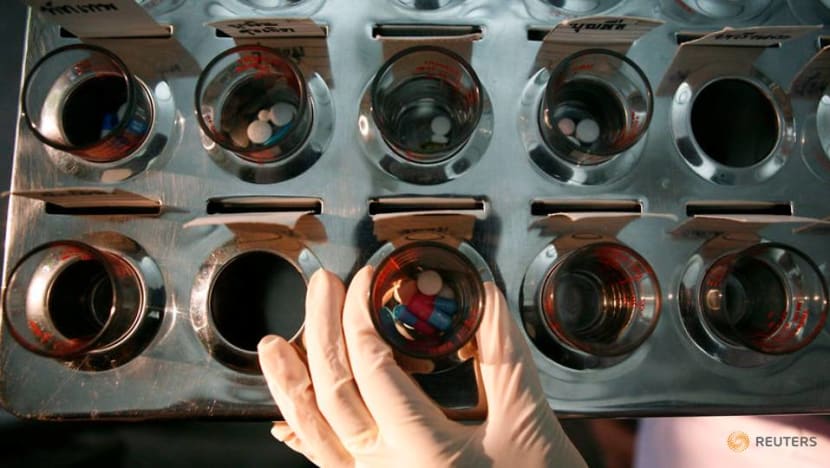Why does Singapore need an HIV registry?

FILE PHOTO: A nurse holds a glass containing a cocktail of HIV/AIDS drugs for a patient at Mercy Centre in Bangkok February 8, 2007. REUTERS/Adrees Latif
SINGAPORE: The term “Human Immunodeficiency Virus (HIV) registry” has been in the headlines since Monday (Jan 28), when the Ministry of Health (MOH) revealed that the personal details of 14,200 HIV-positive people stored in this database were leaked online.
The information was suspected to be leaked by and to still be in the possession of Mikhy Farrera Brochez, an American who has been convicted here of fraud and drug offences.
MOH said that the information in the registry is collected for public health purposes, such as disease surveillance, monitoring the HIV infection situation, conducting contact tracing and assessing disease prevention and management measures.
In the wake of the data leak, some have questioned the need for such data to be collected and stored, but some medical professionals told Channel NewsAsia the registry remains relevant.
Infectious disease specialist from Mount Elizabeth Novena Hospital Dr Leong Hoe Nam said that there is a case for having such a registry because there is a need to monitor HIV cases every year, in order to track changes in the way the disease is transmitted.
“This allows the Government to decide the amount of resources to direct to control the illness, and project healthcare costs,” he said. Under the Infectious Diseases Act, healthcare professionals have an obligation to notify MOH of positive HIV test results.
READ: HIV data leak: Unanswered questions and information gaps remain
Tracking patients using their personal details prevents double-counting, meaning that figures will be accurate, he added. He said that other infectious diseases like tuberculosis and Hepatitis B and C also have registries.
Dr Jeremy Chan, who runs a medical practice in his name, said that tracking HIV trends is important, as Singapore is small and vulnerable, and there is a need to minimise the risk of such infectious diseases. Dr Chan deals with Sexually Transmitted Diseases (STDs) and HIV in his clinic.
According to the World Health Organization (WHO), HIV, which is treatable but cannot be cured, targets the immune system and weakens people's defence against infections and some types of cancer.
The most advanced stage of HIV infection is Acquired Immunodeficiency Syndrome (AIDS), which is defined by the development of certain cancers, infections or other severe clinical manifestations.
READ: 'It's a death sentence': HIV myths debunked
Doctors said that HIV is mainly sexually transmitted and can infect anyone regardless of gender or sexual practices, although when first discovered, HIV was more common among men who have sex with men.
According to MOH's HealthHub portal, 90 per cent of HIV infections in Singapore occur through sexual intercourse, and 45 per cent arise from heterosexual intercourse.
TIME FOR A REVIEW?
However, the doctors said that while these trends are important from a healthcare point of view, there may not be a need for personal details to be stored, or stored permanently.
Dr Chan said that having a registry which only identifies gender and nationality will suffice.
“Patients can be given unique identifiers, which is what we do with other STDs,” he said.
Dr Leong also said it can be argued that tracking trends does not require patients' personal particulars.
READ: The leaking of Singapore’s HIV registry records and the hunt for Mikhy Farrera Brochez, a timeline
In fact, chairman of the Government Parliamentary Committee (GPC) for Health Dr Chia Shi-Lu said that it is worth reviewing to see if there is a need to keep such a database.
“There are ways to tag the disease such that healthcare professionals are aware that a person has been diagnosed, but there may be no need to maintain a database for it," he said.
He said that given the medical advancements over the decade, the disease is now not as infectious, which makes it less necessary for the disease to be tracked using a database.
“ABSOLUTELY NO NEED” FOR REGISTRY
Dr Tan Kok Kuan, chief medical officer at the Doctor Tan And Partners Clinics Group, went as far as saying that there is ”absolutely no need” for a registry.
At the time when the HIV registry was set up in 1985, there was very little understanding of the disease and there was no effective way to treat it, Dr Tan said. His clinic performs anonymous HIV testing.
The difference now is that healthcare officials and professionals know exactly how the virus is spread and also have good effective medical treatments that allow HIV-positive people to lead a healthy life with a normal lifespan, he said.
READ: Doctor at heart of HIV data leak to stand trial in May for drug charges
“At the start, when every little was known about HIV and we were very afraid, such details were required in case we needed to enact draconian measures like enforced isolation to protect public health. These days, HIV is no different from any other chronic disease like high blood pressure or diabetes,” he said.
ADVANCES IN HIV TREATMENT
Dr Tan went even further to say that HIV is “easier to manage than diabetes”, which the Government has declared a war on.
Most people living with HIV only need a single tablet a day, he said, adding that patients who are well managed have an "undetectable viral load" - meaning that there is no measurable amount of HIV virus in their blood.
“They are fit and healthy and you can never tell that they have HIV just by looking at them. Because they have an undetectable viral load, they are also as good as non-contagious,” he said.
In fact, Dr Chan said that many are not aware that there are now more than 30 medications that can be used to treat HIV.
READ: HIV data leak: What we know about Mikhy Farrera Brochez
This is a far cry from the 1980s, when the illness had just started presenting itself and public healthcare officials had their hands full with an unknown potent virus that was fatal left untreated, he said.
Dr Leong said that over the past 10 years, there have been vast improvements in HIV treatment.
“The treatment is getting more potent and causing fewer side effects. The newer drugs are a walk in the park,” he said.
ELIMINATING STIGMA
Even with HIV becoming easier to treat and live with, the stigma against HIV-positive people remains, doctors and sufferers said.
Dr Chan said that anonymising the registry will go some way in eliminating this stigma, while Dr Tan recommended getting rid of it.
READ: 'It's very traumatic': HIV-positive individuals anxious, frustrated after MOH data leak
“Having an HIV registry is akin to the modern version of a leper colony, only worse. Because people living with HIV are of no danger to anyone around them when they are undergoing treatment,” he said.
He added that this contributes to the perception that there is forever something "wrong" with them.
“This fear of being forever on a list and under the watch of a higher authority also makes some people afraid or unwilling to come forward for HIV testing. This has serious public health implications as people who are not diagnosed with unknowingly continue to spread the disease,” he said.
He pointed to numbers that showed that in 2017, 41 per cent of HIV cases diagnosed in Singapore were done so in the late stage.
READ: Mikhy Brochez, American wanted in Singapore for HIV data leak, charged in US for trespassing
Dr Tan and the other doctors, however, cautioned that whether or not the registry is needed or should be anonymous, notification and contact tracing are still necessary to protect individuals and public health at large.
Dr Leong said: “If we don’t know the amount of care required, the numbers can get out of hand. There could be a fire burning in the back garden and we wouldn’t know it.”
Editor's note: An earlier version of this story cited figures from MOH's HealthHub portal which stated that 60 per cent of HIV infections in Singapore arise from heterosexual intercourse. MOH has updated the figure to 45 per cent.












